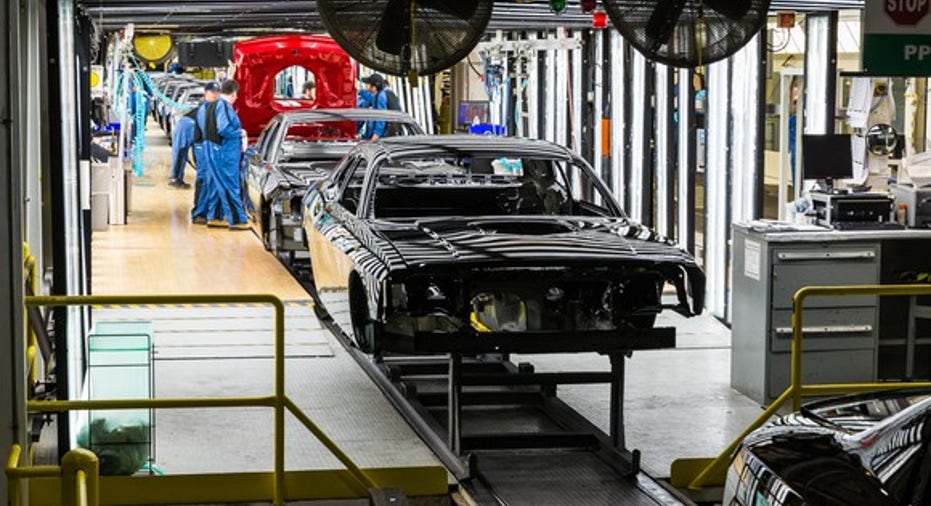Will Fiat Chrysler Automobiles Try to Close a Canadian Factory?

Freshly painted Dodge Challenger body shells moving to an assembly line at FCA's Brampton, Ontario factory. The Brampton factory's fate is in question as FCA and the Unifor labor union open negotiations on a new contract. Image source: Fiat Chrysler Automobiles.
A Canadian labor union has given Fiat Chrysler Automobiles (NYSE: FCAU) until midnight on Oct. 10 to come up with a new four-year contract -- or it'll strike several key FCA factories.
That may sound like a dire threat, but it seems to be the union's traditional way of calling an automaker to the bargaining table when contracts expire. But the fate of an important FCA plant in Ontario may hang in the balance this time around. Here's what is happening.
What's happening: FCA is next up in this round of negotiations
The Unifor labor union represents about 20,000 hourly employees of FCA, General Motors (NYSE: GM), and Ford (NYSE: F) in Canada. The contracts covering most of those employees expired on Sept. 19, which means its time for negotiations.
Like its U.S. counterpart, the United Auto Workers (UAW), Unifor follows a process called "pattern bargaining." Under the process, it pushes hard to get the best deal it can with one company. It then uses that deal as a "pattern," seeking similar concessions in its negotiations with the others.
Unifor chose GM as the "pattern" company in this year's negotiations. The two came to a deal that was ratified by the roughly 4,000 GM workers represented by Unifor on Sunday.
That means it's someone else's turn, and Unifor says FCA is up next.
What's at stake
Unifor represents about 9,750 workers at three FCA plants in Ontario:
- Brampton Assembly builds the Chrysler 300, Dodge Charger, and Dodge Challenger.
- Windsor Assembly builds the Dodge Caravan and Chrysler Pacifica minivans.
- Etobicoke Casting makes die-cast aluminum parts, including pistons for engines.
Simply put, what's at stake is labor peace at those three plants. But one in particular is likely to be the focus of negotiations.
What the union wants from FCA
The union isn't too worried about Windsor Assembly, which has received big investments recently and began building the well-regarded, all-new Pacifica minivan earlier this year.
But Brampton is a different story. Unifor's president, Jerry Diaz, told Automotive News that the Brampton factory is the biggest point of concern for the union and will be the focus of negotiations.
Although Brampton's products, the Chrysler 300 and Dodge Charger and Challenger, are iconic (and in upper-level trims, hugely profitable) products for FCA in North America, the factory has been starved for investment in recent years. That has led, reasonably, to concerns that FCA might intend to close the factory when production of the current-generation models comes to an end in a couple of years.
In particular, Brampton's "paint shop," the section of the factory that paints the cars, is long overdue for a significant upgrade. FCA CEO Sergio Marchionne has said that revamping Brampton's paint shop could cost as much as $1 billion, a sum that he said calls the factory's "long-term viability" into question.
The union wants to answer that question in a way that keeps Brampton open and busy for the next four years.
The "pattern": The union's deal with GM
Diaz said that at the beginning of this round of negotiations, his concerns about FCA's Brampton factory were second only to his concerns about GM's plant in Oshawa, Ontario.
Keeping Oshawa open was a top priority in the union's negotiation with GM, and it was successful: GM agreed to significant investments to build future products in Oshawa. GM also agreed to a series of moderate wage increases and promised to eliminate a pension deficit.
In return, the union agreed that new hires would be enrolled in a new lower-cost, defined-contribution retirement plan instead of the traditional defined-benefit pension plan.
How this is likely to play out
Here's the key to the fate of Brampton: What will happen to the next generation of its products?
The fate of the big Chrysler 300 sedan isn't clear. But the Dodge muscle cars aren't going away. The next-generation models are in development now. They're believed to be using the same rear-wheel-drive "Giorgio" architecture that FCA developed for an upcoming series of Alfa Romeo and Maserati models.
By corporate edict, Maseratis are always built in Italy. But no such edict exists for Alfa Romeo. It's possible that Brampton could be overhauled and retooled to make several new Alfa Romeos along with the Charger and Challenger. That would seem to make a lot of sense.
It's also possible that FCA hasanother plan -- that it will push to close Brampton and make all of those vehicles somewhere else. That would be a bitter pill for theunion to swallow.
From the few hints that Marchionne has dropped, I think it's more likely that FCA will bring Alfas to Brampton.If so, the union should be quite happy. If not, expect fireworks. We'll find out more as negotiations get under way this week.
A secret billion-dollar stock opportunity The world's biggest tech company forgot to show you something, but a few Wall Street analysts and the Fool didn't miss a beat: There's a small company that's powering their brand-new gadgets and the coming revolution in technology. And we think its stock price has nearly unlimited room to run for early in-the-know investors! To be one of them, just click here.
John Rosevear owns shares of Ford and General Motors. The Motley Fool owns shares of and recommends Ford. The Motley Fool recommends General Motors. Try any of our Foolish newsletter services free for 30 days. We Fools may not all hold the same opinions, but we all believe that considering a diverse range of insights makes us better investors. The Motley Fool has a disclosure policy.



















